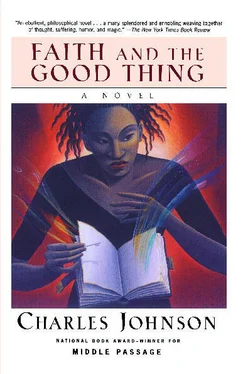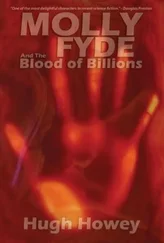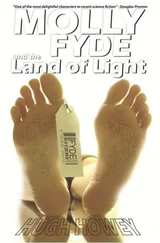Terrible was the Swamp Woman said to be in matters of vengeance. On the Thursday evening just before the evacuation of Atlanta to escape Sherman, the Algonquin boys from the Hollow drank themselves courageous with moonshine; they started out to capture the Swamp Woman with shotguns and hounds. P.T. Barnum would have paid quite a sum for featuring the hoary old hag, but — it is said — she exposed herself in all her otherworldly nakedness to the boys at the foot of the bogs. She drove them mad, children. The older folks all spoke of how the Algonquin boys came running back to town barking on all fours, their hair white as ash, while the dogs were leading them on ropes with toothpicks jutting from their muzzles.
But the tales of the Swamp Woman did not bother Faith. She had, in eighteen years, heard of stranger things. Although tired, she traveled all that evening, and by midnight, was slowly walking, guided by yellow moonlight cutting through the trees overhead, through the swamp. Beneath her feet, the moonlight forced shadows away from crawling vines, often causing them to look like serpents. Through these Faith stepped easily, remembering her father’s eyes, for some strange reason, and his story of the snakes: long ago he had sat her at his feet before the hearth as he warmed his legs, telling her in an awe-softened voice how, when just a boy, he had wandered away from home and become lost in the woods. A snake by his foot had frightened him, but looking closer he discovered it wasn’t a snake at all — just a vine. Life, he told her, would be like that — he told her that someday she would awaken from a life of everyday slumbers and realize all she considered familiar were just shadows. But if she began to look, to search with her mind fresh and her heart yearning for truth as a man weaned on sand thirsts, then she, like everyone in time, would find her way out of the woods. Beyond the shadows. Faith’s search was at an end. In the clearing just ahead was the werewitch’s dwelling.
The Swamp Woman’s shanty was odd, children, squatting above the fetid swamp on wooden poles with a crazy hole for its door. The hole was circular and carved in the side of the shanty where the traditional Door of the Dead belonged, through which a deceased member of a family was carried so that his spirit could never find the proper entrance and thus haunt his own clan. The rear of the shanty was submerged in the swamp, half hidden under water rising as high as the windowsill. Faith held her breath and swatted at bogflies circling her head. Something about the shanty held her still. Its windows seemed to be lit from within by fire. Shadows crept behind tarpaulin stretched across the triangular-shaped windows. Faith inhaled for courage and started across a rickety bridge of damp boards leading to the entrance. Sounds drifted from within — the whir of machinery, an eerie discordant music. She thought of running, of shouting, of balling her fists to calm herself. One could only guess at the bizarre things awaiting her within the shanty. She might not leave it alive. Faith had almost convinced herself to leave when she first perceived a presence behind her: the smell of something old and dry. Heavy breathing, not her own, filled her ears. Without thinking, she turned to face the origin of the labored breath; this she immediately regretted. Crouching at her heels was a hairless old woman whose face held features like those glimpsed in novel arrangements of vegetation, freak potatoes in the shape of cow skulls. It was horrible. Horrible! One tiny eye, the left one, was partially closed and had no pupil — clear it was and the color of egg yolk. The other, a disk, had a green cataract floating free in its center. Such a creature could never have been born — only spawned; never grown — only fermented in some ghastly cesspool. Like the swamp.
Faith jumped back a foot and lost her balance, falling along the moist boards of the bridge. Above her, draped over a burlap gown and resembling dual drops of water suspended in space, hung long, purplish breasts tipped with teats as sharp as nails. Faith glanced away, down, only to have her eyes light upon two misshapen feet gripping the edge of the bridge like fingers. She shivered, stricken by a heavy, sulfurous smell that grew stronger as the potato face drew near. Its lipless mouth moved without sound; the werewitch’s words rang deep within Faith’s mind as the old woman shouted in silence, “You’re here to steal my secret, ain’t ya?”
Faith cringed. “God, no!”
The mouth twisted into a sneer, brandishing teeth as keen as the files of a saw. “Then what’ya want? A potion? Yer boyfriend can’t get it up no mo’ and ya wants a potion, right? Ya know what it takes to make a potion these days, girlie? Eye of newt and auric eggs don’t come as easy as they use to!”
“No,” Faith whispered, “nothing like that.”
The emerald eye, dull and dilated, winked. “Revenge? Ya want to see me turn somebody ya don’t like into a squirrel? Hee hee! That always was my favorite; but his astral body’s gotta be in trine with the right planets before it’ll work.”
“No. ”
“Then ya wants money? Sho! Ya wanna be rich and live forever!”
Faith fainted, the brief escape being pleasant, not quite like dreamwork, but similar to yet greater than reality, for her father was in it, and anything associated with Big Todd Cross had to be for real. She witnessed, as in times past, the occasion when Todd was threatened by the Weaver Clan, who terrorized Hatten County for six years. Or at least until the day they tried to take over Todd’s farm. To a man, the Weavers were mean and ugly. They believed that men were base and the world was a jungle; therefore, they concluded it should be managed by the meanest, ugliest men around. For this, the Weavers all qualified — animals, for fear of being poisoned, did not bite them. And together the Weavers killed so many men that Oscar Lee Jackson had to expand his mortuary and work on Sundays just to keep the county serviced. It started to look like the Weavers were right about the world. They made a mistake, though; they threatened to take over Todd’s farm and, perhaps, Faith, too — just for sport. Faith’s father descended on their ranch like a storm, toting rifles so big they required two men to load them and a third to supervise. The Weavers saw him coming. They turned pale. So pale in fact their eyes turned pink, their hair colorless, and their flesh as pallid as dough. From that day forward the Weavers left Todd alone. Even they saw they’d been wrong. But that didn’t turn them black again. The doctors said Todd Cross had frightened them so the melanin in their blood evaporated in their sweat. Simpler folks just told the truth: Fate had chosen Big Todd as the means to bring albinos to their little spot in Georgia.
“Yow!”
Opening her eyes, Faith realized she was stretched naked on a hard pallet in the shanty, a snow-white cat hissing on her stomach. In her head a thin voice said, “You was dreamin’ about yer daddy — that’s always a bad sign that you’ve lost yer way and need some direction.” Faith, looking across the room, saw the Swamp Woman squatting before a bubbling cauldron, drying her dress. The werewitch nodded toward the cat and said in Faith’s head, “Don’t mind him none. My familiar gets way too familiar sometimes.” Her mouth widened in a silent smile. “Quiet as it’s kept, he’s really the imprisoned spirit of Joseph Arthur Gobineau. I just keep him around to vex every now and then.”
The cat screamed — a bloodcurdling cry that sounded almost like swearing — jumped from Faith’s stomach, rushed to the werewitch’s left leg, and sank in its claws. The cat, receiving a shock of some kind, spun away to sulk near the circular door.
Читать дальше












